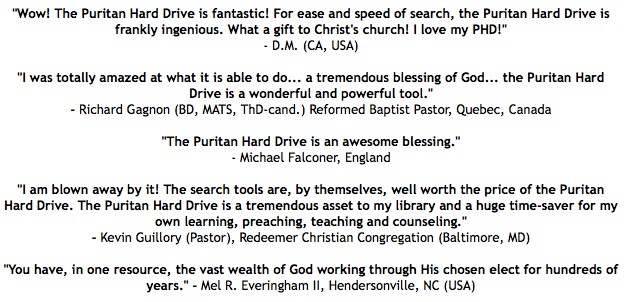 Loading... Please wait...
Loading... Please wait...- SWRB Home
-
Free Resources
- Short Listings Of Free Reformation & Creation Resources
- Free Reformed, Puritan, Covenanter and Creationist Videos
- Thousands of Links to Free Audio, Video and Printed Resources
- Free Puritan Books, Reformed MP3s, and Calvinist Videos
- Puritan Quotes, Free Reformation MP3s, Reformed Books and Calvinist Videos From PuritanDownloads.com On FaceBook
- Shipping & Returns
- Blog
- Privacy Policy
- Contact Us
- Payment Options
- Help
-
About Us
- Sitemap
Pastor Scott Brown, on the left in the video above, is the Director of the National Center for Family-Integrated Churches (NCFIC)
Resource Categories
- PURITAN HARD DRIVE REVIEWS
- PASTOR ROB VENTURA ON THE PURITAN HARD DRIVE
- DR. VODDIE BAUCHAM, JR. ON THE PURITAN HARD DRIVE
- R. C. SPROUL ON SWRB
- DR. JOEL R. BEEKE ON THE PURITAN HARD DRIVE
- PASTOR GREG L. PRICE ON THE PURITAN HARD DRIVE
- DR. MATTHEW MCMAHON ON THE PURITAN HARD DRIVE
- PASTOR SCOTT BROWN ON THE PURITAN HARD DRIVE
- PASTOR W. J. MENCAROW ON THE PURITAN HARD DRIVE
- JOAQUIN FERNANDEZ ON THE PURITAN HARD DRIVE
- PASTOR DAVID SILVERSIDES ON THE PURITAN HARD DRIVE
- JOHN HENDRYX ON THE PURITAN HARD DRIVE
- PASTOR KEVIN GUILLORY ON THE PURITAN HARD DRIVE
- RICHARD BENNETT ON THE PURITAN HARD DRIVE
- DR. KENNY RHODES ON THE PURITAN HARD DRIVE
- JUSTIN RAWSON ON THE PURITAN HARD DRIVE
- PASTOR JAMES WALLACE ON THE PURITAN HARD DRIVE
- PASTOR RICHARD GAGNON ON THE PURITAN HARD DRIVE
- PASTOR JOE HAYNES ON THE PURITAN HARD DRIVE
- DR. STEVEN DILDAY ON THE PURITAN HARD DRIVE
- PASTOR ANDREW COMPTON ON THE PURITAN HARD DRIVE
- TERENCE ELLARD ON THE PURITAN HARD DRIVE
- PASTOR JERRY JOHNSON ON THE PURITAN HARD DRIVE
- PASTOR DAVID PETRIE ON THE PURITAN HARD DRIVE
- JIM DODSON ON THE PURITAN HARD DRIVE
- PASTOR BRIAN SCHWERTLEY ON THE PURITAN HARD DRIVE
- PASTOR PHIL GIBSON ON THE PURITAN HARD DRIVE
- MEL R. EVERINGHAM II ON THE PURITAN HARD DRIVE
- PAUL BLYTH ON THE PURITAN HARD DRIVE
- STEVE KETTLER ON THE PURITAN HARD DRIVE
- D. M. (CALIFORNIA) ON THE PURITAN HARD DRIVE
- MICHAEL CAUGHRAN ON THE PURITAN HARD DRIVE
- WIILIAM NOPPER IV ON THE PURITAN HARD DRIVE
- LINDA THERIAULT ON THE PURITAN HARD DRIVE
- WILLIAM WARNOCK ON THE PURITAN HARD DRIVE
- ROBERT KOH ON THE PURITAN HARD DRIVE
- WHAT'S ON THE PURITAN HARD DRIVE?
- ALL PURITAN HARD DRIVE VIDEOS
- PHD-ODE INSTALLATION VIDEOS
- COMMENTS ON SWRB
- ALL PURITAN QUOTE VIDEOS
- PURITAN HARD DRIVE SCREENSHOTS
- PURITAN HARD DRIVE MINISTRY AND DONATION OFFERS
- TABLE OF RESOURCE CATEGORIES
- Advanced Studies
- SWRB SERMONAUDIO MOBILE APP
- Apologetics
- Assurance
- Attributes and Holiness of God
- Augustine
- Banner of Truth
- Baptism
- Beginners
- Bibles (Geneva, KJV, Hexapla, etc.)
- Biblical Counseling
- BIBLICAL HD COLLECTION
- Biblical Interpretation (Hermeneutics)
- Biographies and Autobiographies
- Calvinism and the Sovereignty of God
- CALVINISM HD COLLECTION
- CALVINIST CLASSICS HD COLLECTION
- Charles Spurgeon
- Children's Books
- CHRISTIAN EDUCATION HD COLLECTION
- Christian History
- Church Government
- Civil Government and Resistance
- CLASSIC CHRISTIAN HD COLLECTION
- Classic Puritan and Reformed Sets
- Commentaries
- Contemporary Issues
- Covenant Theology and Covenanting
- COVENANTER HD COLLECTION
- Covenanters and Covenanted Reformation
- Creation and Creationism
- Creeds, Confessions and Covenants
- Cults, False Religions, Psychology, Humanism
- Dealing with Affliction, Suffering, and Sickness
- Debates
- Dutch Reformed
- Education and Home Schooling
- English Puritans, Covenanters and Reformers
- Family, Children, Home, and Family Worship
- First Reformation
- Five Points of Calvinism (TULIP)
- For Pastors and Elders
- For Seminary Students
- FREE PURITAN & REFORMATION MP3 AUDIO SERMONS/BOOKS
- FREE PURITAN BOOKS, REFORMATION MP3s, PDFs, VIDEOs
- George Gillespie
- God's Law, The Ten Commandments, etc.
- Greg L. Price on Headcoverings
- Heaven, Hell and the Final Judgment
- Holy Days (Lord's Day, Christmas, Easter, etc.)
- HOME SCHOOL HD COLLECTION
- Intermediate Studies
- John Bunyan
- John Calvin
- John Knox
- John Owen
- Jonathan Edwards
- Justification
- Languages, Dictionaries, Reference, etc.
- LOOK WHO LOVES THE PURITAN HARD DRIVE
- Lord's Supper (Communion)
- Marriage, Courtship, etc.
- Martin Luther and Lutheranism
- Martyrs and Persecution
- Other Protestant Works
- Predestination and Providence
- PRESBYTERIAN HD COLLECTION
- Presbyterians and Presbyterianism
- Prophecy, Antichrist, and Eschatology
- PROTESTANT HD COLLECTION
- PSALM SINGING MP3s (COMPLETE SET)
- Psalters, Psalm Singing and Music
- Puritan Facts
- PURITAN FAST SERMONS (1640-1653) - 34 VOLS SET
- Puritan Fast Sermons 1640-1653
- Puritans and Puritanism
- PURITAN HARD DRIVE
- REFORMATION HD COLLECTION
- Reformation History
- Reformed and Puritan Classics
- Reformed Baptist
- REFORMED BAPTIST HD COLLECTION
- REFORMED HD COLLECTION
- REFORMED PRESBYTERIAN HD COLLECTION
- Reformed Presbytery, RPNA Protesters, etc.
- Reformed Theology
- Reformed Worship, The Regulative Principle, etc.
- Roman Catholicism, the Jesuits, Islam, etc.
- Salvation and Evangelism
- Samuel Rutherford
- Sanctification, Prayer and Holiness
- Scottish Covenanters
- Scottish Presbyterianism
- Scripture Song MP3s (Psalms and Bibles Verses)
- Second Reformation
- Separation, Unity, Uniformity, etc.
- Sermons and Sermon Collections
- Solemn League and Covenant
- Theology and Doctrine
- Third Reformation
- Thomas Watson
- Westminster Confession, Assembly and Divines
- Authors (All A to Z)
Phone Orders:
(780) 450-3730
To obtain free Reformation books, Puritan MP3s and Calvinistic videos, SWRB discount coupons, etc., add yourself to SWRB's Puritan and Reformed email list by using the form above.
Alexander and Rufus; or a Series of Dialogues on Church Communion, in Two Parts... by John Anderson
Resource Details
Resource Description
Alexander and Rufus; or a Series of Dialogues on Church Communion, in Two Parts. Part 1: Vindication of Scriptural Church Communion in Opposition to Latitudinarian Schemes. Part 2: Defence of the Communion Maintained in the Secession Church (1862)
The close communion doctrine of the Reformation continues to be much misunderstood and maligned in our day. The false ecumenists (and theological egalitarians and pluralists) of our day continue to batter away at this foundation of the Reformation doctrine of the church -- while even many of those that profess to be the heirs of the Reformation are found to be ignorant regarding this point.
Any doctrine of communion which does not take into account the biblical command to "be of one mind" (cf. Rom. 15:6, 2 Cor. 13:11, Phil. 1:27, Phil. 2:2, 1 Pet. 3:8) at a corporate, visible level is skewed from the beginning.
In short, latitudinarian schemes of open communion (which only include the so-called "essentials" of the faith) are schismatic (i.e. if we do not confuse "schism" with "separation"). Schismatic schemes promoting open communion (of which paedocommunion is presently at the head), attempt to "dumb down" (to a greater or lesser degree) the requirements for partaking at the Lord's table.
Loose and latitudinarian schemes of communion lead to churches that stand for little -- or nothing -- over time; while a Scripturally regulated close communion tends to the exact opposite end. Anderson makes this very point in his preface to this book, "corruption is the native consequence of latitudinarian schemes, (while) scriptural order in sacramental communion tends to make the visible church a heaven on earth to the faithful, terrible as an army with banners to her enemies, and to her King and Head for a name, for a praise and for glory."
If you love the purity and peace of Christ's church and agree with the words of John Calvin, when he wrote, "We are only contending about the true and lawful constitution of the church, required in the communion not only of the sacraments (which are the signs of profession) but also especially of doctrine" (Institutes, 4.2.12), then you will find a meaty meal in Alexander and Rufus -- for the author not only deals with the larger questions related to church communion, but also weaves into the fabric of this book many specific threads relating to practical applications and doctrinal controversies.
Moreover, notwithstanding a couple of peculiar doctrinal foibles originating from the Seceder camp, in opposition to the Covenanters (especially regarding civil government and some points of the law), a plethora of subjects relative to the Reformed view of communion, church union, testimony-bearing, etc., are all dealt with here -- and these points are given the kind of attention (along with Scriptural and historical accuracy) that will be greatly appreciated among those familiar with the precise views of the "old dissenters" of Scottish origin.
In short, Alexander and Rufus gives us an excellent defense of biblically regulated close communion, which Anderson shows to be God's ordained method of promoting truth, unity and Reformation. Anderson also does an excellent job concerning:
- Calvin's plan for promoting a union among the churches (p. 151ff.)
- the place of confessions and confessional subscription (pp. 85, 179)
- covenanting (pp. 358-384)
- separation (pp. 92, 132)
- worship (pp. 10-13, 87, 107, 142, 155, 161-164, 456ff., etc.)
- the marks of the church (p. 132ff.)
- uniformity (pp. 7, 103, 168, 205)
- the Westminster Assembly (p. 169ff)
- the Dutch views (p. 158f.)
- distinctions between essentials and non-essentials (p. 168)
- the so-called "glorious revolution" of 1688 (p. 263)
- the French Reformed churches (p. 156)
- the covenanted Reformation (p. 253)
- discipline (p. 103)
- attainments (pp. 11, 93, 137, 162ff., 206, etc.)
- the government of the church (p. 123)
- the so-called "Apostle's creed" (pp. 100-104)
- the Belgic Confession (pp. 135-138);
- councils in the ancient church (p. 104)
- the Donatists (p. 112)
- the forsaking of sin, false doctrine, and false teachers (pp. 92, 132)
- occasional hearing (p. 83)
- Owen against open communion (p. 207)
- sectarianism (p. 92)
...and much, much more.
On the topic of church and sacramental communion you are unlikely to find many other books with as much solid information. Recommended for advanced study.
Indexed, 528 pages.
All resources for sale on this website, with the exception of Scottish Metrical Psalms MP3s, are available on the Puritan Hard Drive .
VIDEO INTRODUCTION TO THE PURITAN HARD DRIVE


Phone Orders:
(780) 450-3730
To obtain free Reformation books, Puritan MP3s and Calvinistic videos, SWRB discount coupons, etc., add yourself to SWRB's Puritan and Reformed email list by using the form above.








































